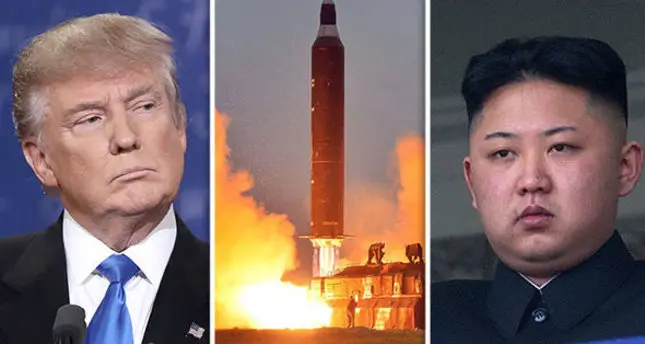Back in World War II, they had a saying, “Loose Lips Sink Ships.” What it meant was that innocent talk of what people might have learned from soldiers might also be heard by the enemy, putting those very soldiers (or sailors) in danger. These days, “loose lips” sink politicians.
The latest example is Donald Trump’s brag that we’re sending an “armada” to intimidate North Korea.
The Navy announced April 9 that the USS Carl Vinson Strike Group, including the carrier and two guided missile destroyers, was ordered to “sail north and report on station in the Western Pacific Ocean.”
Following the Navy’s announcement, a U.S. official told Reuters the deployment of the group of ships was a “necessary” show of force because of North Korea’s recent behavior, which included a failed missile test. President Donald Trump went on to say the U.S. was “sending an armada” to counter the North Korean threat.
“Armada, armada,” where have I heard that word before? Oh, yes, it was when the greatest navy the world had ever known decided to punish another country by sending an “The Spanish Armada” in 1588–and was humiliated.
Off the coast of Gravelines, France, Spain’s so-called “Invincible Armada” is defeated by an English naval force under the command of Lord Charles Howard and Sir Francis Drake. After eight hours of furious fighting, a change in wind direction prompted the Spanish to break off from the battle and retreat toward the North Sea. Its hopes of invasion crushed, the remnants of the Spanish Armada began a long and difficult journey back to Spain.
Then, England stupidly made the same mistake.
England launched a counter Armada the following year—with equally disastrous results.
Almost as soon as the humiliated Armada vanished over the horizon, Elizabeth began planning a counterattack to destroy the last of Philip II’s navy and bring the Spanish Empire to its knees. By April 1859, she had outfitted Sir Francis Drake and Sir John Norris with over 120 ships and dispatched them on a mission to invade Spain. It was a bold plan, but unfortunately for Elizabeth, her “English Armada” fared no better than the Spanish one.
The point is, words matter. Especially when they have historical meaning. We saw the same problem in 2001, when George Bush used the word “Crusade” to describe our Christian nation’s attack on an Islamic one, after 9/11. The Europeans, who have a better sense of history, cringed.
On Sunday, Bush warned Americans that “this crusade, this war on terrorism, is going to take awhile.” He and other US officials have said that renegade Islamic fundamentalist Osama bin Laden is the most likely suspect in the attacks.
His use of the word “crusade,” said Soheib Bensheikh, Grand Mufti of the mosque in Marseille, France, “was most unfortunate”, “It recalled the barbarous and unjust military operations against the Muslim world,” by Christian knights, who launched repeated attempts to capture Jerusalem over the course of several hundred years.
Barack Obama made a similar mistake in a news conference, when a reporter asked if there wasn’t some way we could go to war with Syria (please, please, please), Obama said that massive use of chemical weapons might be a “red line.” He said, “That would change my calculus. That would change my equation.” Obama didn’t mean it to sound like an ultimatum, but that’s how it was heard, and he was beat up about it for the following four years.
Then, there was Gerald Ford’s flub in 1976, which may have cost him his election.
During a 1976 presidential debate against a then-obscure Georgia governor named Jimmy Carter, Gerald Ford famously uttered, “There is no Soviet domination of Eastern Europe.” The moderator, Max Frankel of the New York Times, responded incredulously, “I’m sorry, what? … Did I understand you to say, sir, that the Russians are not using Eastern Europe as their own sphere of influence in occupying most of the countries there and making sure with their troops that it’s a communist zone?” But Ford refused to back down from his original statement, insisting that Poland, Romania and Yugoslavia were free from Soviet interference.
What Ford meant, of course, was that the United States shouldn’t RECOGNIZE Soviet domination, but the damage had been done. Words matter. That was not a historical reference, but it has become one.
In 1863, George Santayana, the Spanish philosopher, essayist, poet and novelist, said something that our politicians would be wise to heed: “Those who cannot remember the past are condemned to repeat it.”
That’s why we usually elect presidents who know something about history, and the lessons it has to teach us. We would be wise to elect a learned president again.
Donate Now to Support Election Central
- Help defend independent journalism
- Directly support this website and our efforts
